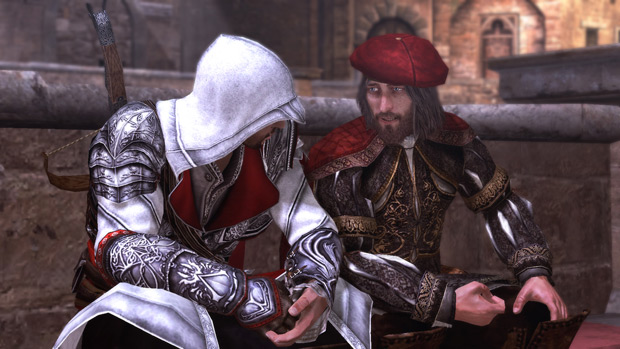 How can you see with that veil pulled over your eyes?
How can you see with that veil pulled over your eyes?
Ubisoft consistently brings the funny. The publisher will release the PC version Assassin’s Creed: Brotherhood, also known as Assassin’s Creed II 2, next week. The “deluxe” edition edition of the game contains an mp3 version of the soundtrack. So far, so good. Ubisoft has made the “deluxe” items available to download for people who’ve pre-ordered the game, that is, if you’ve pre-ordered this edition you can download the mp3 soundtrack right now. Upon inspecting the metadata of those mp3 files it was discovered that they’ve been re-encoded from a readily available pirated FLAC version of the game’s soundtrack, available at your friendly neighborhood BitTorrent site. Hilarious.
So there’s two problems here, as I see it. One is that Ubisoft isn’t giving you the highest quality music in the first place. Why encode from FLAC to MP3 if you, presumably, have access to the master files? Yes, FLAC is lossless, but considering Ubisoft owns the music itself you’d think the’d have the decency to transcode from the source files rather than a fan-made FLAC.
The second problem is, obviously, the use of pirated material, and this wouldn’t be such a hilarious issue if it weren’t for Ubisoft’s insane stance vis-à-vis DRM in recent years. This is the company that bangs and bangs away about evil, evil pirates ruining civilization itself, and yet here it is, plain as day, using pirated material in its own official releases. In a sense you’re paying for pirated material.
This isn’t even the first time Ubisoft has been caught using pirated material. Remember back in 2008 when it was discovered that it used a No-CD crack for one of its Rainbow Six games?
Then again, I suppose it can be argued that, since Ubisoft actually owns the copyright here, it technically can’t infringe upon its own rights by using a illegitimate version of the soundtrack. Which just goes to show you how convoluted copyright law is these days.
Ubisoft hasn’t said why this particular incident occurred. It could just be the case of a lazy employee not wanting to ask the music department for access for the source files, or it could be that, being such a big company, things go slowly over there. Perhaps the request for the music’s source files was put in, but the mighty working of the company was simply too slow for the files to trickle down in time.
Or, of course, it could be a work designed to get heat for the company.
In any event, I sure would like to hear the company try to explain away this situation.